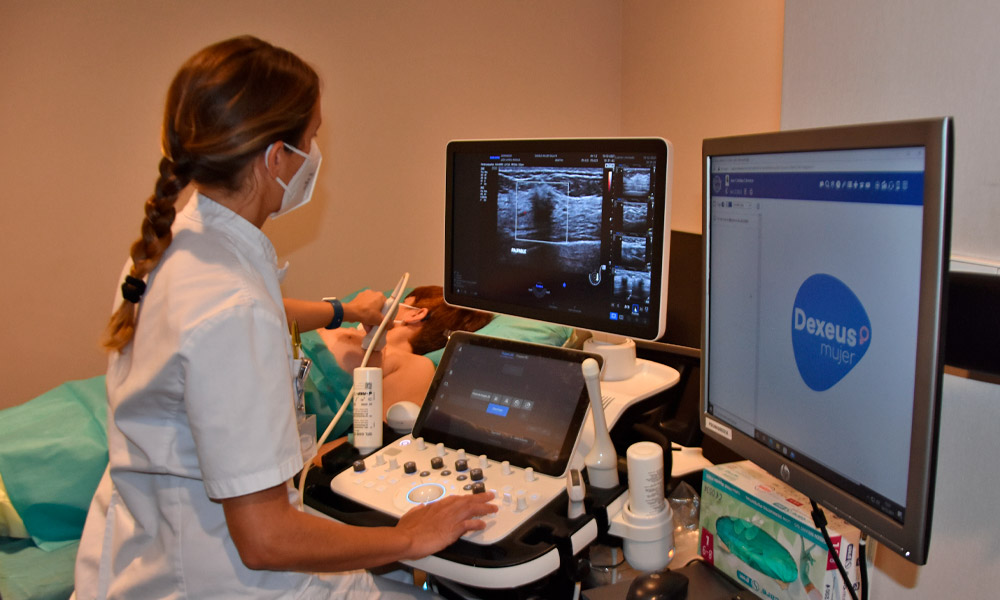Menu
Menu

The diagnosis of breast cancer is based on the study of images obtained from mammograms. However, in the case of dense or fibrous breasts, it is more difficult and it is often necessary to carry out other complementary tests. In fact, according to Dexeus Mujer statistics, of every 100 women who undergo mammography, 70 % require an ultrasound scan to complete the study. Of these, 2-3 will be biopsied, and, of these, only 1 case will confirm cancer. Not all images have the same level of suspicion. This means biopsies that cause a lot of stress and worry for patients.
For this reason, a team from the Gynaecological Diagnostic Imaging Service (DGI) in Dexeus Mujer has conducted a retrospective study to evaluate the effectiveness of a new system based on Artificial Intelligence in order to refine the diagnosis of breast cancer. This technology, developed by the company Koios Medical, has been authorised by the FDA and the European Medicines Agency (EMA).
To validate the efficacy of the system, a total of 403 echo-guided biopsies performed in 2019 on women of different ages were selected. These images were obtained during gynaecological check-ups performed by the DGI Service in Dexeus Mujer. According to the pathology report, 197 were classified as malignant lesions and 206 as benign. The authors chose the image that best represented the classification obtained on the BI-RADS scale and evaluated it with the Koios AI system. The results of this study evidence that the use of AI can help refine the diagnosis, as it increased the proportion of suspected malignant cases that were ultimately confirmed by biopsy in the highest risk categories: BI-RADS 4, 5 and 6.
Reference article:
AI: Can It Make a Difference to the Predictive Value of Ultrasound Breast Biopsy?
Jean L. Browne, M.A. Pascual, J Perez, S. Salazar, B Valero, I. Rodriguez, D Cassina, JL Alcázar, S. Guerriero, B. Graupera.
Diagnostics 2023, 13(4), 811. doi: 10.3390/diagnostics13040811.
DEXEUS CAMPUS
Gran Vía de Carles III 71-75
08028 Barcelona
campus@dexeus.com
(+34) 93 227 47 09
® Copyright 2021-2024 Dexeus Mujer Foundation – Gran Via Carles III 71-75. 08028 Barcelona. Spain
| Cookie | Duration | Description |
|---|---|---|
| cookielawinfo-checkbox-analytics | This cookie is set by the GDPR cookie consent plugin. The cookie is used to store the user's consent for cookies in the "Analytics" category. | |
| cookielawinfo-checkbox-functional | The cookie is set by the GDPR cookie consent to record user consent for cookies in the "Functional" category. | |
| cookielawinfo-checkbox-necessary | This cookie is set by the GDPR cookie consent plugin. Cookies are used to store the user's consent for cookies in the "Necessary" category. | |
| cookielawinfo-checkbox-others | This cookie is used by the GDPR component. It is used to store the user consenting cookies in the "Other" category. | |
| cookielawinfo-checkbox-performance | This cookie is set by the GDPR cookie consent plugin. The cookie is used to store the user's consent for cookies in the "Performance" category. | |
| elementor | ||
| viewed_cookie_policy | The cookie is set by the GDPR cookie consent plugin and is used to store whether or not the user has consented to the use of cookies. It does not store any personal data. |
| Cookie | Duration | Description |
|---|---|---|
| _icl_visitor_lang_js | To allow multi-language functionality for web content. | |
| wpml_browser_redirect_test | Used to verify if cookies are allowed in the browser. |
| Cookie | Duration | Description |
|---|---|---|
| _ga | The _ga cookie, installed by Google Analytics, calculates visitor, session and campaign data and also tracks site usage for the site's analytics report. The cookie stores information anonymously and assigns a randomly generated number to recognize unique visitors. The _ga cookie, installed by Google Analytics, calculates visitor, session and campaign data and also tracks site usage for the site's analytics report. The cookie stores information anonymously and assigns a randomly generated number to recognize unique visitors. | |
| _ga_1WD9MFDMJK | This cookie is installed by Google Analytics. |
| Cookie | Duration | Description |
|---|---|---|
| wp-wpml_current_language | Necessary for the operation of the website in the different languages |